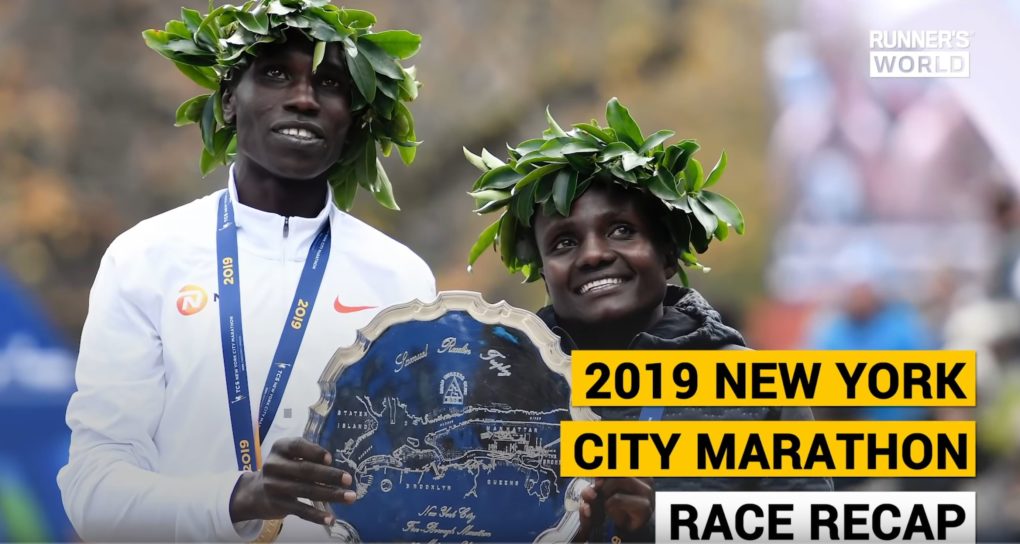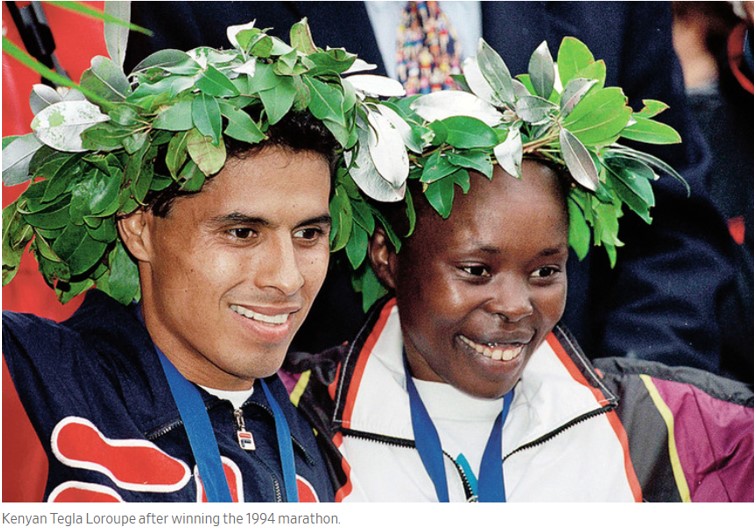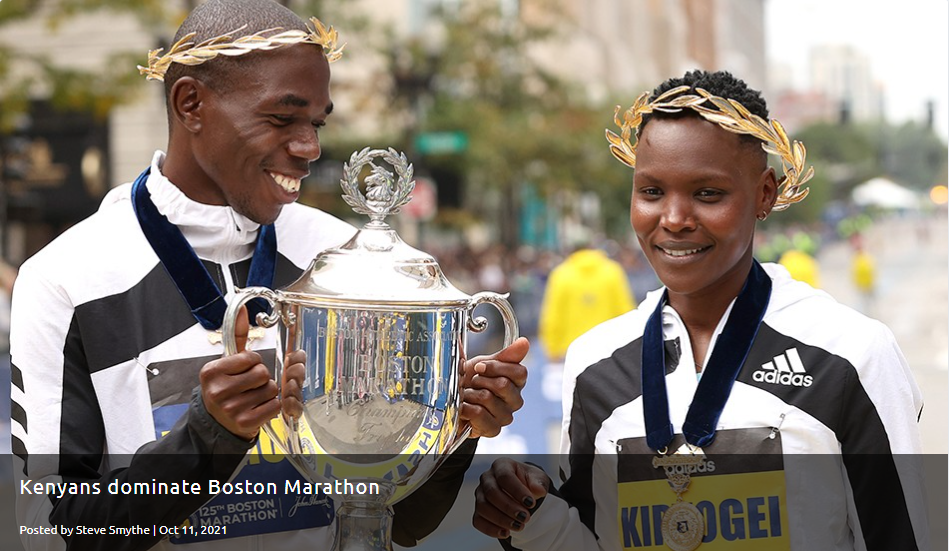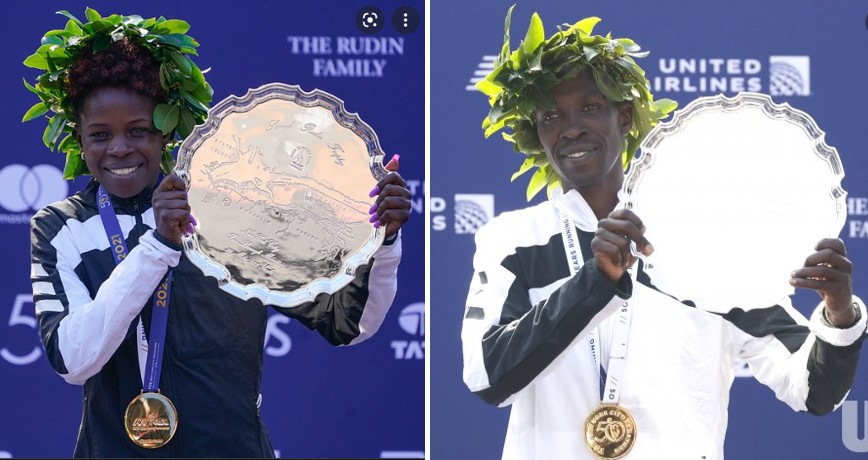 By Neenah Payne
By Neenah Payne
In the 2021 New York City Marathon on November 7, men’s winner Albert Korir and women’s winner Peres Jepchirchir made it a Kenyan sweep. Korir won the men’s race two years after finishing second and Jepchirchir became the only woman to take a marathon major after earning the Olympic gold medal — which she won in Japan 13 weeks ago. Viola Cheptoo of Kenya finished second and Ababel Yeshaneh of Ethiopia was third. Mohamed El Aaraby of Morocco placed second and Eyob Faniel of Italy was third in the men’s race.
Tegla Loroupe’s ’94 NYC Marathon Win Reverberated in Africa
The Kenyan Woman’s Victory Inspired Others to Follow Her, and They Have
Kenyans dominate Boston Marathon
Diana Kipyogei and Benson Kipruto won women’s and men’s races in the 2021 Boston marathon on October 10.
 Mary Keitany of Kenya and Lelisa Desisa of Ethiopa, the 2018 marathon winners.
Mary Keitany of Kenya and Lelisa Desisa of Ethiopa, the 2018 marathon winners.
The NYC Marathon was canceled in 2020 because of “COVID”.
In 2019, Kenyans and Ethiopians swept the NYC Marathon for 1-2-3 in the men’s race and women’s race. Geoffrey Kamworor of Kenya won $100,000 for his victory and another $10,000 for breaking 2:10 with a finish of 2:08:13. Kamworor won in 2017 and was on the medal podium in each of the four NYC Marathons he ran. Kenyan Joyciline Jepkosgei holds the world’s record in half marathons. In an historic debut in her first marathon, she became the youngest woman to win the New York City Marathon this century, with a finishing time of 2:22:38 — just 7 seconds from the record! In 2017, Jepkosgei broke four world records in a single event and was the first Kenyan to break six world records in six months.
In 2018, a man from Ethiopia and a woman from Kenya won. In 2018, Ethiopian men attained their third victory in the race’s history — compared to Kenya’s 14 wins. Since they began entering the NYC, Boston, London, and Berlin marathons in the 1980s, it has been a foregone conclusion that Kenyans will take most of the top spots.
What’s special about Kenyan runners? A number of researchers are trying to figure out the key to their success and what the rest of the world can learn from them. There is a fascinating cluster of unusual factors in their winning formula.
What Makes Kenyans Such Good Runners?
The Kenyan runners points out:
“Today the Kenyan dominance in middle- and long-distance running is so profound that it has no equivalence to any other sport in the world. Critical physiological factors for performance in running include maximal oxygen consumption (VO2max), fractional VO2max utilization and running economy (energetic cost of running). Kenyan and non-Kenyan elite runners seem to be able to reach very high, but similar maximal oxygen uptake levels just as there is some indication that untrained Kenyans and non-Kenyans have a similar VO2max. In addition, the fractional utilization of VO2max seems to be very high but similar in Kenyan and European runners. Similarly, no differences in the proportion of slow muscle fibers have been observed when comparing Kenyan elite runners with their Caucasian counterparts.
In contrast, the oxygen cost of running at a given running velocity has been found to be lower in Kenyan elite runners relative to other elite runners and there is some indication that this is due to differences in body dimensions. Pulmonary system limitations have been observed in Kenyan runners in the form of exercise-induced arterial hypoxemia, expiratory flow limitation, and high levels of respiratory muscle work. It appears that Kenyan runners do not possess a pulmonary system that confers a physiological advantage. Additional studies on truly elite Kenyan runners are necessary to understand the underlying physiology which permits extraordinary running performances.”
The reasons why Kenyans always win marathons lie in one region said in 2019:
Last month, Eliud Kipchoge finished a marathon in 1 hour, 59 minutes and 40 seconds – an audacious feat that no one had ever accomplished before. Kipchoge is from the Kenyan Rift Valley region. A day after he made history, Brigid Kosgei destroyed the women’s world record at the Chicago Marathon. She’s also from the Kenyan Rift Valley. And in the New York Marathon on Sunday, a Kenyan rookie took down her country’s rock star in the women’s race. Joyciline Jepkosgei ruined countrywoman Mary Keitany’s chance at a fifth women’s title in the contest, but the latter came in second. And Kenyan Geoffrey Kamworor won the men’s race, his second NYC Marathon victory.
They’re all from the Rift Valley region. And people are taking note – marathoners from all over the world go there to train before major races. East Africans – especially Kenyans and Ethiopians – have dominated marathons for decades, dashing across finish lines as their exhausted competitors barely made it. In the process, they’ve toppled their own records or those of their fellow citizens. Kenyan marathon runners are such a phenomenon that research organizations have done studies on why they dominate long distance races. And experts say it’s mixture of several things.
Most of the elite runners are from the same region
Most Kenyan elite runners hail from the same ethnic groups known as the Kalenjins and the Nandis. The groups make up just 10% of the nation’s population of 50 million – but bring in a majority of the nation’s marathon medals.
“Internationally, Kalenjin runners have won close to 73% of all Kenyan gold medals and a similar percentage of silver medals at major international running competitions,” says Vincent O. Onywera, a professor of exercise and sports science at Kenyatta University in Nairobi. They’ve passed on the passion for running across generations, turning the Rift Valley – especially the small town of Iten – into a mecca for the nation’s elite long distance runners. There, children start running at a young age.
A lot of the young people from these areas grow up surrounded by successful runners. Most of them look at running as a way to make money, says coach Bernard Ouma, who trains elite Kenyan runners. “You see your neighbor run and win, it motivates you to run and win,” he says. As a result, their communities have a deep tradition of running excellence built over the years.
They train and live in a high-altitude area
Most of the Kenyan runners who dominate marathons worldwide train and live in the high-altitude Rift Valley. Iten, one of the towns that produces elite runners, sits nearly 8,000 feet above sea level in western Kenya. Training at high altitudes contributes to a running dominance that makes running at lower elevation child’s play, Onywera says. “There is a widespread belief in the athletic community that altitude training can enhance sea level athletic performance, with at least three independent studies demonstrating that altitude training increases both sea level maximal oxygen consumption and running performance,” he says.
Then there’s diet and constant motivation
Iten has become known internationally as the place where long distance champions are made. So much so, runners from around the world go there to train before major races. Running aficionado and author Adharanand Finn spent a lot of time in the town trying to find out the secret to Kenyan marathon runners. “I had a lifelong fascination with the uninhibited running style of the Kenyans and had always wanted to know the story behind their incredible athletes – I wanted to know what their lives were like. And when I saw there was no book, or at that time no films, on the subject, I decided to go there and write one.”
His book, “Running with the Kenyans,” gives more insight into what he found out. And there is no one major secret, he says. “As the famed coach of David Rudisha, Brother Colm O’Connell, says, the only secret is that there’s no secret. It’s not one thing but a perfect storm of elements that come together in Kenya’s Rift Valley region to make the people there so strong at distance running,” Finn says.
There’s the location, the way of life, the environment. “For a start, you have the altitude, the tough rural upbringing and the fact that children run around everywhere. Then there is the simple diet, the lack of junk food, and the perfect running terrain — rolling hills, dirt roads — all over the place,” he says. And if that doesn’t lure you in, there’s the proximity to international elite runners to motivate anyone.
“Running offers a great chance to make good money, to transform lives, even to transform whole communities,” Finn says. “This is compounded by the hundreds of role models everywhere. Almost every village has someone who has come back from ‘abroad’ with winnings, and these stars are very accessible and open to supporting the younger athletes.”
As a result, everyone who can run, aspires to be a runner, he says. “You end up with thousands of people training together, pushing each other, helping each other, inspiring each other. This attracts agents, sponsors, coaches … and it keeps getting bigger. With all this impetus, some great athletes are going to emerge out the other end,” he says. “So really, it’s not a simple answer.”
Some have wondered whether genes play a role
There’s so much speculation on why Kenyans and Ethiopians keep crushing marathon competitions, the phenomenon has long been a subject of study. Organizations such as the British Journal of Sports Medicine have concluded that it’s unclear whether genes have anything to do with it.
“The periodic domination of middle and long distance running by different regions of the world is not a new phenomenon,” it says. “Researchers are yet to confirm a genetic or physiological advantage in being a middle or long distance runner of East African origin, and it is most likely that the reasons for their success are many.” And while many physiological and anatomical factors have been suggested to explain the East African dominance, research has not revealed any definitive advantage, the study says.”
Eight Reasons for Kenyan and Ethiopian Dominance says: “ There’s a very interesting review paper in next month’s issue of the International Journal of Sports Physiology and Performance, from two well-known scientists — Randy Wilber of the USOC’s Athlete Performance Lab and Yannis Pitsiladis of the University of Glasgow — called “Kenyan and Ethiopian Distance Runners: What Makes Them So Good?” Now there’s a topic that can spark some arguments!
To start, the authors lay out the eight possible factors most commonly cited as a reason for the dominance:
- genetic predisposition;
- development of a high maximal oxygen uptake as a result of extensive walking and running at an early age;
- relatively high hemoglobin and hematocrit;
- development of good metabolic “economy/efficiency” based on somatotype and lower limb characteristics;
- favorable skeletal-muscle-fiber composition and oxidative enzyme profile;
- traditional Kenyan/Ethiopian diet;
- living and training at altitude; and
- motivation to achieve economic success.
A couple of thoughts after reading the paper. They spend the largest amount of time looking at the evidence for a genetic advantage, laying out the three main lines of inquiry: mitochondrial DNA (mom’s fault); Y-chromosome research (dad’s fault); and the search for individual genes that explain performance. In all cases, studies have failed to turn up convincing evidence that Kenyans and Ethiopians (or, more specifically, the Kalenjin and Arsi tribes that produce most of those countries’ star runners) are predisposed to success. As a result, at least one of the authors concludes that “the East African running phenomenon is not a genetically mediated phenomenon on the basis of the data reviewed here and elsewhere.”
I’m not convinced. After all, as I blogged a few months ago, you could perform the exact same tests and conclude that your height has nothing to do with genetics either. The simple fact is that our scientific abilities, combined with the small sample sizes in studies of elite runners, make it essentially impossible to conclude anything either way about genetics and distance running success. Maybe sometime in the future, but not yet.
What I find particularly confusing is how they reconcile the argument against genetics with reason number (4), which refers to “somatotype and lower limb characteristics.” They describe some interesting research that found that elite Kenyan runners had 5% longer legs and 12% lighter calves that elite Scandinavian runners: Thus, it appears that the innate ectomorphic somatotype of elite Kenyan runners may contribute in part to their success on the track and roads via enhanced biomechanical and metabolic efficiency.
Perhaps there’s a distinction that I’m missing here, but if having long, thin legs is an advantage in distance running, and if Kenyans are more likely to have long, thin legs, isn’t that a population-level advantage that can be traced back to genetics?”
More Information
Why Do Kenyans Win The Marathons?
How Kenya Builds The Fastest Humans On Earth
Why is Eliud Kipchoge So Much Better Than Everyone Else?
The reasons why Kenyans always win marathons lie in one region
Born to Run: Why Do East Africans Dominate Long Distance Running Events?
Scientists are closer to pinning down why the world’s best marathon runner is so good
Kenyan and Ethiopian distance runners: what makes them so good?:
“Since the 1968 Mexico City Olympics, Kenyan and Ethiopian runners have dominated the middle- and long-distance events in athletics and have exhibited comparable dominance in international cross-country and road-racing competition. Several factors have been proposed to explain the extraordinary success of the Kenyan and Ethiopian distance runners.”
Why Are East African Runners So Dominant?:
“It isn’t just your imagination. Yes, East African runners have a tendency to dominate every running record on the books with reason. It isn’t just that their lifestyle is quite a bit more difficult than other cultures, often requiring that they work long and arduously strenuous manual labor hours. But, it also may be in their genetic makeup and evolution. Kenyan and Ethiopian athletes have held the top spots in running for the past five decades, first coming on the scene at the 1969 Mexico City Olympics. It isn’t that their average times are that much faster than the average gold-winning runner, it is that they have an uncanny ability to sprint to the finish line at extreme speeds, the likes that no one has ever been capable.”
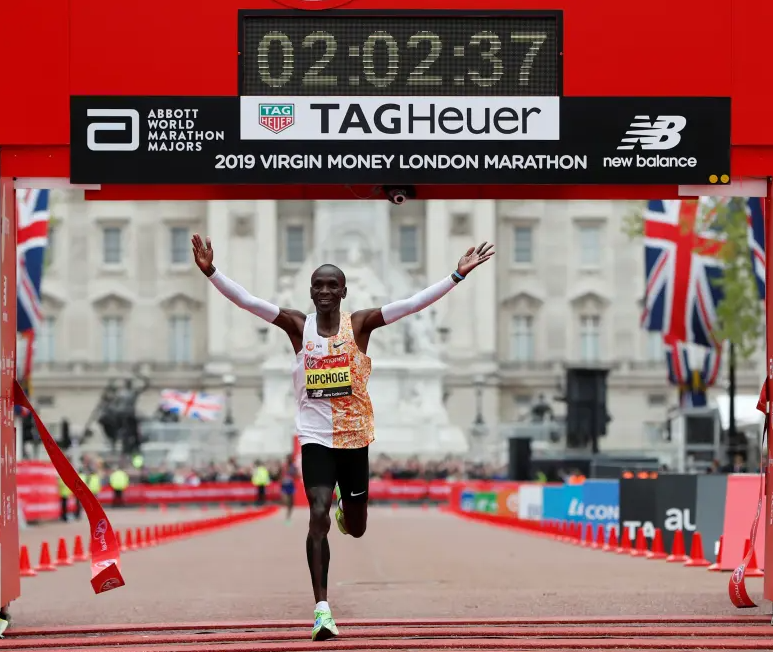 Kenya’s Eliud Kipchoge celebrates winning the men’s race and setting a new course record for London Marathon in 2019.
Kenya’s Eliud Kipchoge celebrates winning the men’s race and setting a new course record for London Marathon in 2019.
Neenah Payne writes for Activist Post and Natural Blaze
Become a Patron!
Or support us at SubscribeStar
Donate cryptocurrency HERE
Subscribe to Activist Post for truth, peace, and freedom news. Follow us on Telegram, HIVE, Flote, Minds, MeWe, Twitter, Gab and What Really Happened.
Provide, Protect and Profit from what’s coming! Get a free issue of Counter Markets today.
